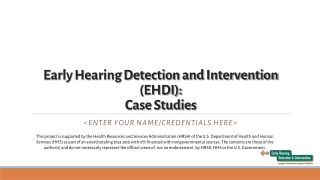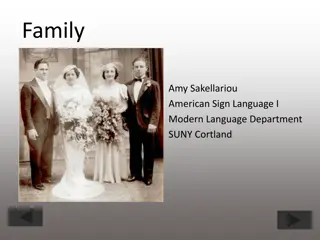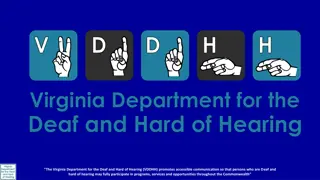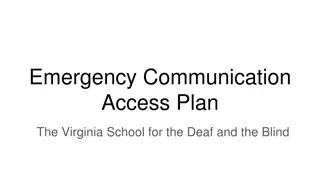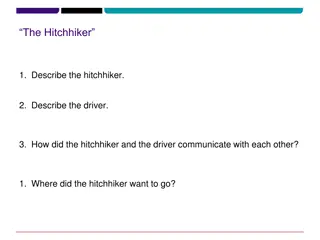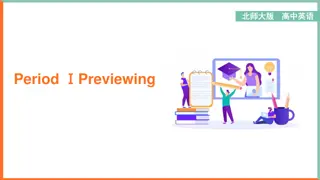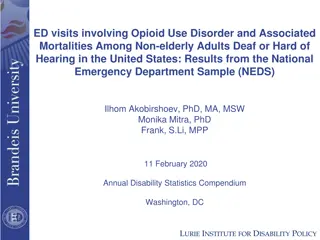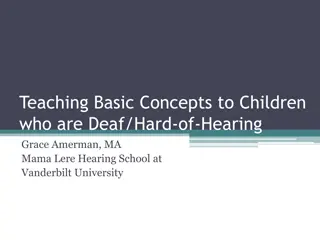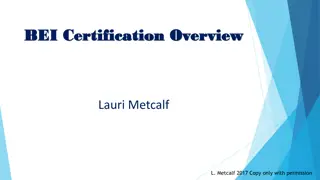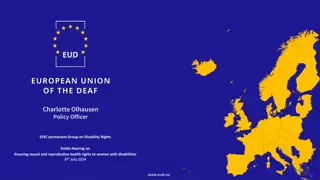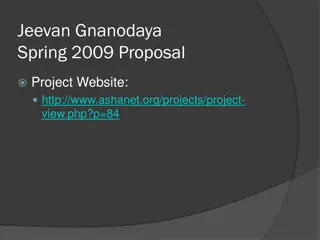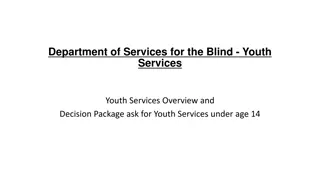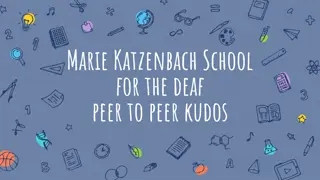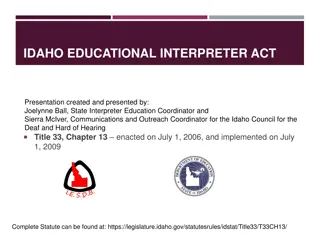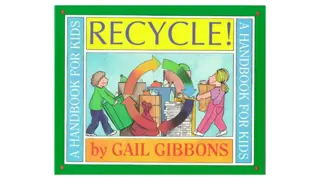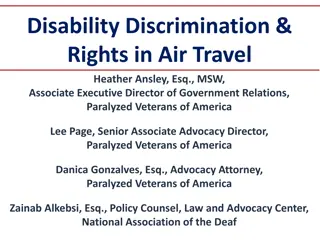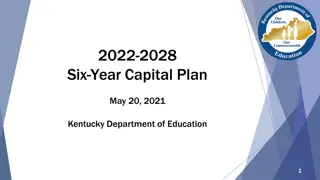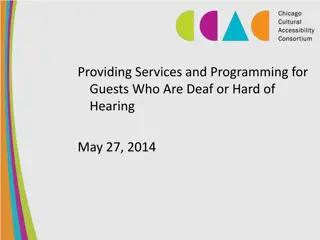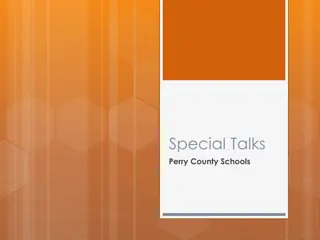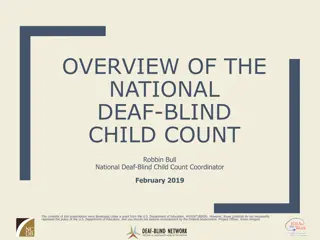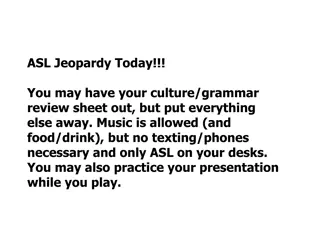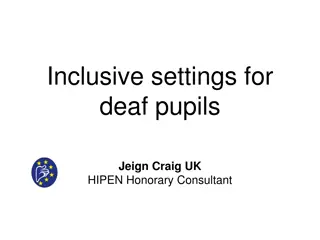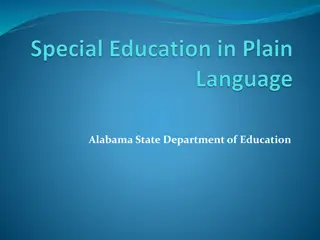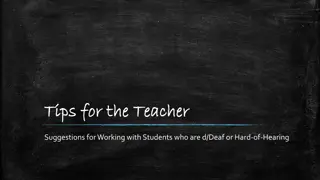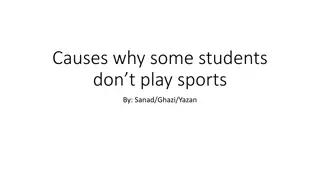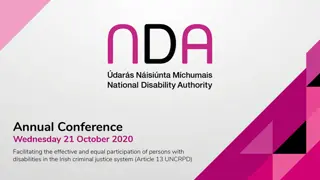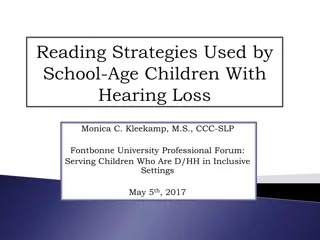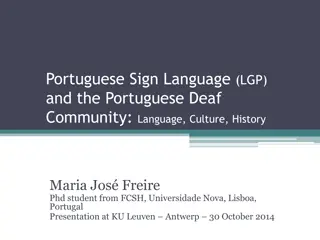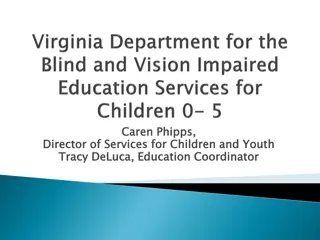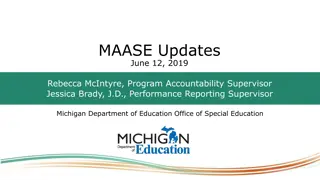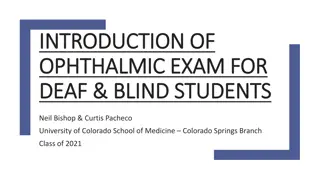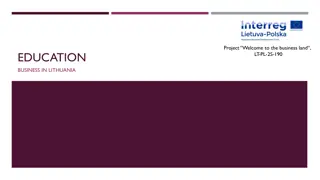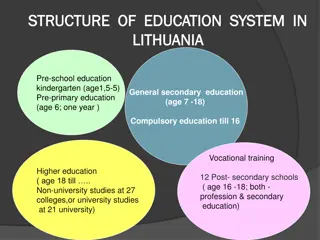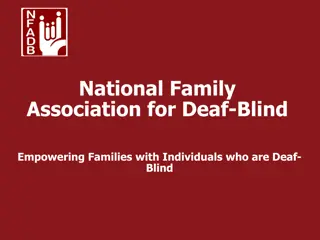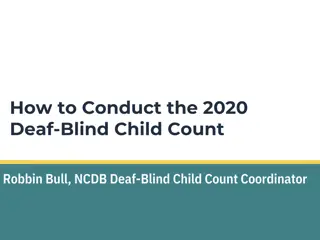Early Hearing Detection and Intervention (EHDI)
Explore case studies showcasing the experiences of families in the EHDI system, highlighting the need for early intervention for children who are deaf or hard of hearing. Supported by HRSA.
0 views • 19 slides
Special Education Language Acquisition (SELA) Program Updates for 2023-2024 School Year
This presentation focuses on changes for the official XML data submissions during the 2023-2024 school year related to Special Education Language Acquisition (SELA) program. It covers updates, guidance, contacts, submission details, FAQs, application updates, code table changes, and more critical in
3 views • 23 slides
American Sign Language for Family Members: Parameters, Signs, and Culture
Explore the world of American Sign Language (ASL) in the context of family relationships. Learn about the five parameters of sign language, including handshape, location, movement, non-manual markers, and palm orientation. Discover how to sign family members such as mother, father, brother, and sist
0 views • 11 slides
Virginia Department for the Deaf and Hard of Hearing (VDDHH) Programs and Services
The Virginia Department for the Deaf and Hard of Hearing (VDDHH) promotes accessible communication for individuals who are Deaf and hard of hearing to participate fully in programs, services, and opportunities throughout the Commonwealth. Services include Technology Assistance Program (TAP), Interpr
0 views • 15 slides
Enhancing Emergency Communication Access Plan at Virginia School for the Deaf and the Blind
Virginia School for the Deaf and the Blind (VSDB) is taking steps to improve its emergency communication access plan to ensure all individuals on campus, including those who are deaf, hard of hearing, blind, or vision impaired, have full access to emergency alerts and instructions. The plan includes
3 views • 14 slides
The Hitchhiker Encounter: A Silent Journey to Las Vegas
A father working overtime, a Deaf driver, and a hitchhiker communicating through gestures and writing embark on a unique journey. The hitchhiker, a bald man with a bushy beard, seeks to reach Las Vegas as they encounter a police stop and engage in silent exchanges with law enforcement.
0 views • 19 slides
Helen Keller's Life-Changing Encounter with Anne Sullivan
Helen Keller's life took a monumental turn on the third of March, 1887, when her teacher Anne Sullivan arrived. Through innovative teaching methods, Helen learned to spell and understand the world around her, unlocking a life full of wonder and overcoming her disabilities to become a renowned educat
1 views • 41 slides
Opioid Use Disorder and Mortality Among Non-elderly Deaf/Hard of Hearing Adults in the US
This study examined the risk of opioid use disorder (OUD) related emergency department (ED) visits and mortality among non-elderly adults who are deaf or hard of hearing (DHH) in the United States. Using data from the National Emergency Department Sample (NEDS), researchers found significant associa
0 views • 21 slides
Providing Support for Deaf and Hard of Hearing Communities in the Black Country
Deirdre Maguire, a Community Development Officer at Zebra Access, works tirelessly to empower Deaf, DeafBlind, and Hard of Hearing individuals in the Black Country. The organization offers a wide range of services, including advocacy, community development, well-being programs, employment support, a
0 views • 11 slides
Teaching Basic Concepts to Deaf/Hard-of-Hearing Children
Teaching basic concepts is crucial for deaf/hard-of-hearing (D/HH) children as it forms the foundation for learning and thinking. These concepts—such as location, number, descriptions, time, and feelings—are best learned through concrete examples. D/HH students benefit from focused, one-at-a-tim
0 views • 12 slides
Evolution of Relay Services for Deaf and Hard of Hearing Individuals
The history of relay services for the deaf and hard of hearing dates back to the 1960s in the USA. Three pioneering deaf men played a significant role in establishing the first successful deaf telephone network, leading to the development of relay services as we know them today. This evolution enabl
0 views • 29 slides
History of BEI Certification Development
The history of BEI certification development began in 1994 when the Texas Commission for the Deaf and Hard of Hearing initiated collaboration with experts to establish a new certification exam. Over the years, partnerships were formed, test development activities were conducted, and licensing agreem
1 views • 73 slides
Challenges Faced by Deaf Women in Accessing Sexual and Reproductive Health Rights
Deaf women encounter significant obstacles in exercising their sexual and reproductive health rights, including gender-based violence, discrimination, and communication barriers. The European Union of the Deaf highlights critical issues such as systemic marginalization, lack of information in sign l
0 views • 8 slides
Project Proposal for Jeevan Gnanodaya School for the Deaf
Jeevan Gnanodaya School for the Deaf, part of Jeevan Gnanodaya Charitable Trust, provides education, vocational training, and support to speech and hearing-impaired children from poor rural backgrounds. The project aims to offer formal education till Class 12, including speech therapy, and industria
0 views • 16 slides
Comprehensive Youth Services for the Blind
Department of Services for the Blind offers a range of youth services for those under age 14, including career exploration, peer interaction, self-advocacy, and workshops. The in-house staff provides hands-on experiences to broaden awareness of available work options, connects students with peers, a
0 views • 10 slides
Marie Katzenbach School for the Deaf Peer-to-Peer Kudos Program Overview
Explore how the Katzenbach Peer-to-Peer Kudos program works this year, allowing staff members to recognize each other for Respect, Responsibility, and Kindness. Send Kudos via a designated link and view all recognitions on the Kudos Bulletin Board. Discover the exciting incentives and prizes offered
0 views • 4 slides
Idaho Educational Interpreter Act Overview
Idaho Educational Interpreter Act was enacted in 2006 to improve interpreting services in public schools for students who are deaf, hard of hearing, or deaf-blind. The act defines qualifications for educational interpreters, including specific criteria for Sign Language, Oral Transliterators, and Cu
0 views • 25 slides
Effective Ways to Combat Water Waste, Renewable Energy, Liquid Medicines, Pollution, and Resources
Explore effective strategies for combating water waste in companies, the benefits of solar panels as a renewable energy source, information on using liquid medicines safely, insights on pollution and its impact, and valuable resources for supporting deaf children and reducing ocean plastic pollution
0 views • 11 slides
Ensuring Rights and Accessibility in Air Travel for Passengers with Disabilities
Air travel is governed by laws like the Air Carrier Access Act and DOT Passenger Bill of Rights to prevent disability discrimination. Passengers have rights to dignified treatment, accessible information, assistance with disabilities, and resolving issues. Complaints can be filed for violations, inc
0 views • 16 slides
Overview of Kentucky Department of Education's Capital Plan
The Kentucky Department of Education's Capital Plan outlines the infrastructure and development projects for various educational facilities, including the Kentucky School for the Blind, Kentucky School for the Deaf, and the Leadership Training Center. The plan encompasses renovations, expansions, an
0 views • 12 slides
Providing Services for Guests Who Are Deaf or Hard of Hearing
This content provides valuable insights into serving guests who are deaf or hard of hearing. It covers terminology, communication methods, technology options, understanding identity, education opportunities, and effective communication tips. Emphasizing empathy, inclusivity, and practical guidance,
0 views • 26 slides
Special Education and Supporting Children with Different Disabilities
This content provides valuable information on special education processes, the Perry County Special Services Team, dealing with various disabilities such as autism, developmental delay, and deaf/blindness, and practical tips for supporting children with special needs. It emphasizes the importance of
0 views • 20 slides
Overview of National Deaf-Blind Child Count
The National Deaf-Blind Child Count, led by Robbin Bull, provides a comprehensive historical review and collects demographics to assess state-level needs for children and youth with deaf-blindness. The initiative aims to ensure high-quality services, research, and personnel preparation for individua
0 views • 23 slides
Interactive ASL Jeopardy Enhancing Deaf Culture Knowledge
Engage in a fun and educational ASL Jeopardy game to enhance your understanding of Deaf culture, history, grammar, and fast facts. Test your knowledge on topics like Deaf education, prominent figures such as Gallaudet and Alexander Graham Bell, and important aspects like name signs. Discover more ab
0 views • 54 slides
Inclusive Settings for Deaf Pupils: UK Experience and Challenges
The UK has a history of deaf education dating back to 1825, with various models developed over the years for integrating deaf pupils into mainstream settings. However, challenges persist in providing specialized language and communication support for deaf children, impacting their learning and socia
0 views • 16 slides
Special Education Process and Intervention Strategies in Alabama State Department of Education
Special Education Process and Intervention Strategies in Alabama's State Department of Education involve implementing intervention strategies in the general education program before referring a child for special education evaluation. The process includes referral meetings, consent for evaluation, in
1 views • 17 slides
Effective Strategies for Supporting Deaf or Hard-of-Hearing Students
Explore valuable tips for teachers working with students who are deaf or hard of hearing, including environmental recommendations like flexible seating and minimizing noise distractions. Discover teaching modification suggestions such as gaining attention, using visuals, and facilitating participati
0 views • 29 slides
Reasons Why Some Students Don't Participate in Sports
Based on a survey and interviews conducted by Sanad, Ghazi, and Yazan, the causes for students not engaging in sports include the lack of swimming pools, inadequate equipment, and challenges faced by deaf students during physical education classes. Solutions proposed include building swimming pools,
0 views • 6 slides
Supporting Deaf People's Access to Justice: Insights from Legal Professionals
This research project conducted by Dr. Bronagh Byrne from Queen's University Belfast explores the perspectives and experiences of legal professionals in supporting Deaf individuals in accessing the justice system. The study aims to identify areas for improvement in supporting Deaf people, highlighti
0 views • 16 slides
Reading Abilities in Deaf/Hard of Hearing Children
Monica Kleekamp discusses the delayed reading abilities of children who are deaf/hard of hearing and explores the correlation between reading levels and phonological awareness. Different approaches to reading instruction and research questions on reading strategies, narrative comprehension, and impa
0 views • 21 slides
Portuguese Sign Language: History, Achievements, Cultural Significance
Portuguese Sign Language (LGP) holds a rich history within the Portuguese Deaf Community, marked by an official recognition in 1995 and subsequent legal protection. The LGP has evolved over centuries to meet the community's needs, even evident in historical narratives. Further advancements include b
0 views • 21 slides
DBVI Education Services Program for Children
The DBVI Education Services program offers support to children who are blind, vision-impaired, or deaf-blind, focusing on educational and developmental activities. Education Coordinators conduct Functional Vision Assessments to aid in planning services and collaborating with professionals. They also
0 views • 10 slides
Budget Review Subcommittee on Primary and Secondary Education
Review the proposed budget for the Kentucky Department of Education, including allocations for teacher salary increases, SEEK funding adjustments, textbook funding, and support for preschool programs in disadvantaged areas. Explore details on campus information for Kentucky School for the Blind, Ken
0 views • 12 slides
MAASE Updates
In these updates, key personnel like Rebecca McIntyre and Jessica Brady from the Michigan Department of Education's Office of Special Education discuss federal monitoring initiatives, goals for onsite visits, and optimizing outcomes for students who are deaf or hard of hearing. The updates also cove
0 views • 20 slides
Enhancing Ophthalmic Exams for Deaf & Blind Students
This project focuses on improving access to ophthalmic exams for deaf and blind students at the Colorado School for the Deaf and Blind. Through collaboration with community partners, addressing specific needs, and utilizing available assets, the project aims to overcome barriers and provide necessar
0 views • 15 slides
Education System in Lithuania: Structure and Pathways
Education in Lithuania is free and compulsory from age 6 to 16, structured into pre-school, pre-primary, primary, basic, and upper secondary cycles. Vocational and technical education options are available, leading to tertiary education at universities or colleges with Bachelor-Master-PhD degrees. P
0 views • 13 slides
Education System in Lithuania
The education system in Lithuania comprises pre-school education, pre-primary education, general secondary education, vocational training, higher education, and post-secondary schools. It is mandatory for children to attend school until the age of 16, with various educational paths available afterwa
0 views • 10 slides
NFADB: Empowering Deaf-Blind Families Since 1994
Nonprofit NFADB supports families with deaf-blind members, advocating for their needs and fostering community inclusion. Offering memberships, benefits, and volunteer opportunities, NFADB aims to empower and provide resources to individuals with hearing and vision impairments.
0 views • 16 slides
Conducting the 2020 Deaf-Blind Child Count
Information on the 2020 Deaf-Blind Child Count including data reporting requirements, timeline for changes, where to find resources, and a guide on reporting methods and materials.
0 views • 19 slides
Famous Deaf People Finals Review
This PowerPoint presentation is a review for the matching famous Deaf people portion of the final exam. It includes a fun matching game and the answers are provided in slides 5 and 6. Get ready to study and test your knowledge about famous Deaf individuals!
0 views • 3 slides
